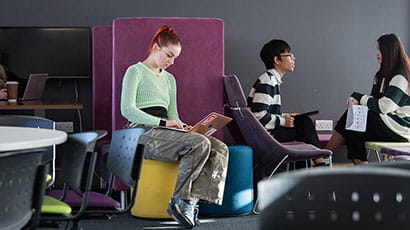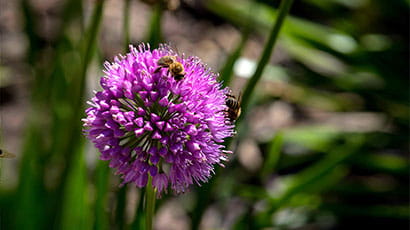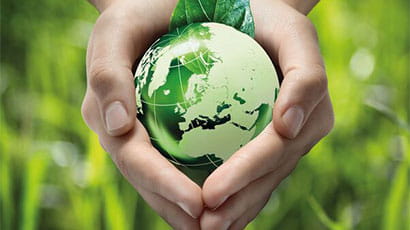Creating a greener future
Sustainability is at the heart of everything we do at UWE Bristol. From building the UK’s first low carbon student accommodation, to providing allotment space for our students to grow their own veg, and our researchers getting alternative protein on the menu in schools – we are working together towards a greener future. And our campus developments are putting us on track to be a carbon neutral university by 2030.
Making fashion more sustainable
There’s nothing more personal than the clothes you’re wearing. But how sustainable are they? See how our fashion textile students and staff are taking on fast fashion.
Food production
Environmental issues with food
We have all seen shocking images of food waste pouring out of rubbish trucks. It feels uncomfortable seeing such large quantities of food being thrown away in a world where famine is still a reality. Food production demands huge resources and has a massive impact on the environment. We asked Associate Professor Verity Jones what we can do to reduce food waste and the impact our food choices have on the environment.
What is happening in food production?
The statistics are alarming. Verity explains "Half of the habitable land on the planet is used for farming and agriculture. We literally don’t have enough cropland to feed a growing population." Though there is significant interest in plant-based diets in the UK; globally the picture is quite different with meat consumption set to increase by 76% by 2050. "We can’t ignore the impact this is having and, unfortunately, meat production is responsible for significant greenhouse gas emissions and food related deforestation."
So are insects really a viable alternative to more traditional proteins like meat? Verity is proving through her research with the Pembrokeshire based ‘Bug Farm’ that they most definitely are. "Insects are high in protein, vitamins and minerals and they emit fewer greenhouse gases. They also need less space and less water."
She explains "In other parts of the world insects have been a staple source of protein for hundreds of years. However, the continued growth in demand for cows and chickens for food is having a huge impact. More land is cleared to make way for more livestock. Local habitats and their wealth of biodiversity are then threatened."
Verity’s focus
When it comes to bugs, Verity is doing more than just research in this area. She’s working with the ‘Bug farm’ to get edible insects on the menu in schools. "We’ve been working with Pembrokeshire County Council and are hoping to see insect protein on the menus soon. The feedback from young people has been incredibly positive. They want tasty, healthy and filling food to get them through their day and are keen to choose sustainable options. We’re proving that different types of food and an open approach to what we eat can be incredibly valuable to people and planet. Insects may look gross to many but can be added to foods as powders for a sustainable power boost."
The good news
Verity explains that progress is being made in many areas of food production and we have much to feel optimistic about "New technology and innovation mean that there are great opportunities to reduce food waste during the production cycle. Strawberries are a great example. By shifting growth from the ground to table top, farmers are seeing less damaged fruit and can use land that is closer to storage, packing and distribution facilities – all reducing the estimated 10,000 tonnes of strawberries that are wasted each year."
What we can all do. Verity's top 3 tips on food
It doesn’t have to be anything radical. If we all do a little bit it can make a massive difference.
- just buy what you need and eat it
- be creative with leftovers (and save money)
- try to eat a little less meat.
Making festivals greener
As the restrictions of the pandemic ease, a festival filled summer is something we’ve all been longing for. As life gets back to normal and we pack away the tents, we ask what the environmental impact of festivals is.
We caught up with Briony and Clare, two of our Events Management academics with a special interest in sustainability.
Issues
The rate of global warming triggered the UN to issue a ‘code red’ for humanity in 2021. This means that we need to reduce carbon emissions in order to slow the impact of global warming. Festivals are resource intensive and contribute to these carbon emissions.
Yet, as Clare explains: "events need particular climactic conditions. For example, regattas need the right tidal conditions, balloons can only fly in calm skies and winter sports events can only go ahead with snow.’ She warns ‘we are starting to see the effects of climate change on the events industry with festivals being cancelled because of adverse weather conditions and water shortages."
Briony stresses that "it’s not just about the way that we behave at events but also what we’re doing to protect the very land that these events are held on. Festivals are at risk of being cancelled if we don’t protect the land that they’re held on."
Briony and Clare are helping change things
Festivals are a great opportunity to try things out. Clare describes attendees as "feeling free to experiment with identities, perspectives and behaviours" and Briony describes the unique festival environment as "a great space to trial sustainability interventions." They are both researching how event organisers can make events more sustainable.
Clare is doing research to help guide organisers of Boomtown Fair. ‘Boomtown’ is a faux city where actors play characters and engage festival goers in play in different ‘districts’ of the city. In 2019, the festival used this alternate reality game to communicate the urgency of the climate crisis to festivalgoers. Participants joined an Extinction Rebellion takeover of the capitalist ‘district’ of Boomtown, similar to the real-world takeover of Oxford Circus. Afterwards almost 70% of survey respondents said that they would be more likely to join a real-life environmental protest. "It’s really important data showing that Boomtown Fair’s efforts to encourage festivalgoers’ environmental intentions are impactful".
Briony is passionate about bringing a sustainability message to all elements of her teaching. "I lead on the undergraduate Business and Events Management course. We initially focus on concepts like herd behaviour and escapism that have an impact on festival sustainability. In the second year, we move on to look at practical tools, such as carbon footprint calculators and offsetting. By the final year, students run their own events, where sustainability is an important aspect that needs to be considered and evaluated. By the time our students graduate, I know that they’re going into the industry with a really solid understanding of the importance of sustainability."
Tips on how can we all help when we’re at festivals and events
- picking up litter is still hugely important. Try and avoid waste that will go into landfill or even recycling
- use public transport and remember to take a reusable water bottle with you
- invest in good quality festival gear that you can use and enjoy for a long time to come.
Fast fashion
Impacts of fast fashion to the environment
Fast fashion is a buzz word that we’re all hearing more frequently, whether it’s in the news, on our social feeds or in relation to advertising on the much famed ‘Love Island’. But what exactly does the term mean?
We caught up with Associate Professor Verity Jones who shed some light on what the phrase really means and shared some shocking statistics revealing the impact the industry is having on the environment.
Verity explains “Fast fashion is essentially inexpensive clothing that is mass produced by retailers quickly and in response to the latest trends. This means that consumers can snap up affordable styles soon after they have seen them on celebrities and cat walks. The problem is that they don’t get worn for long before they are discarded in favour of the next trend".
She describes the UK as being at "an epicentre of fast fashion in Europe – buying and discarding far more than many of our European neighbours." This is fuelling a cycle of overproduction and overconsumption that’s having a direct impact on the environment. In the UK alone 13 million items of clothing end up in landfill every year.
The fashion industry is responsible for 8% of global greenhouse gas emissions and consumes more energy than the aviation and shipping industries combined. It’s production techniques also demand vast quantities of water which end up back in our waterways polluted by dyes and chemicals.
Then there is the social and humanitarian cost – pay is notoriously low for garment workers and working conditions are often dangerous. The fast fashion industry lacks transparency and it’s difficult to determine whether child or slave labour has been involved in production processes.
How we're making a difference
These statistics make for alarming reading but Verity stresses that "we need to also look for the good news stories and focus on the things that we can feel positive and optimistic about."
The work that Verity is doing at UWE Bristol is part of making that change. Through her teaching and research she is tackling issues around environmental and social injustice. She explains that this means ‘"looking at the impact our actions have on planet and people and exploring what we can do to change things for the better."
One example of this is the free online course ‘Who Made My Clothes?’ that Verity delivers. It has attracted over 70,000 learners to date. "This really shows that people are interested in the issues around fast fashion and want to learn more about how they can make positive changes."
Verity’s background is in teaching and she’s also passionate about making sure we do as much as we can to support and educate children. She explains that "eco anxiety is a huge problem. 50% of children seen by counsellors and psychologists disclose it as a concern. To tackle this head on we have worked with Friends of the Earth to develop supportive resources that parents can access from their website.
Verity's top 3 tips for sustainable fashion
Verity’s top 3 tips for sustainable fashion:
- buy clothes that you love and wear them
- wash them less frequently
- check out the fashion transparency index to find out which brands are prioritising sustainability.
Better by bike
Hear from student, Laura who explains why cycling is so beneficial and how UWE Bristol is making cycling an easy travel option for students.

Read more"The single biggest thing we can all do to reduce our IT carbon footprint is to use renewable electricity from sources such as wind and solar. UWE Bristol was ahead of the curve on this, installing 2,000 solar panels on site and going fully renewable in 2016."
Ian Brookes Senior lecturer
Meet Ian
Ian is a Senior Lecturer in Sustainable IT. After a career working in management consultancy, including several years in the fossil fuels industry, Ian made the switch to research and teaching. The focus of his PhD is designing sustainable IT systems. Guided by the UN Sustainable Development Goals, he now teaches students across the university about the importance of sustainability and equips them with the knowledge that they need to strive for a greener future.
My work here is varied and rewarding
The first group of students to study the Sustainable Business and Computing module graduated in 2021. "It’s incredibly rewarding to know that I’ve contributed to their journey."
Ian’s own PhD looks at how systems engineers can design more sustainability into the systems that they make. He explains "autonomous vehicles are a good example of this, what can we do to make sure that the software and hardware components built into the design are as sustainable as possible?"
What can we all do to make our IT usage more sustainable?
- Check that our electricity providers are 100% renewable
- Try not to upgrade phones until you really need to. Look at providers who make it easier to maintain and repair devices
- Look at what you buy and where you buy it. Buying short lived products online has a negative impact.
You may also be interested in

Undergraduate study
Everything you need to know about undergraduate study at UWE Bristol including courses, accommodation, fees and funding, employability and life at UWE Bristol.

Courses and applying
Explore our courses and find out everything you need to know about your chosen course from applying to fees and funding.

Sustainability at UWE Bristol
Sustainability is embedded in our culture, research and teaching. We have already invested heavily in campus improvements and new technology, with plans underway to be carbon neutral by 2030.

Climate Education
Climate Education is a free online course for all students, available through Blackboard.
